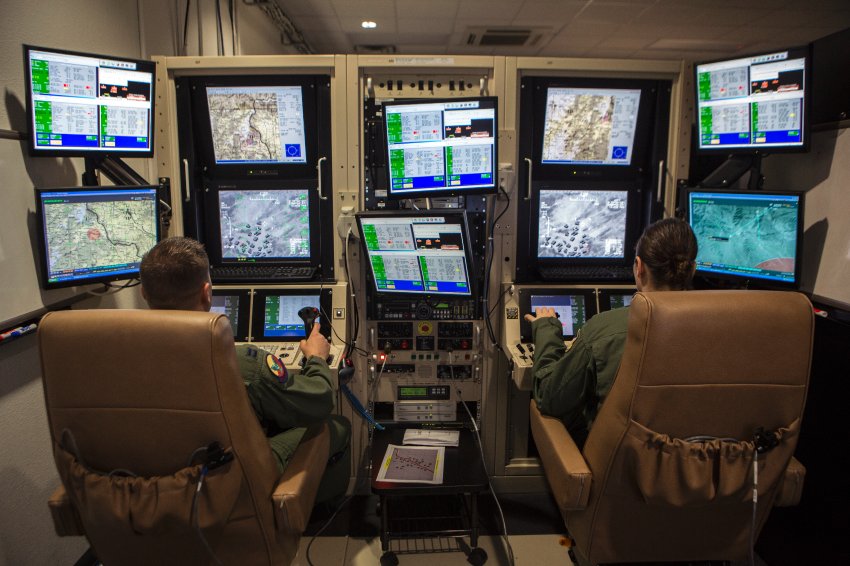Being There: UAV Crews & Combat Valor
By Scott Spangler on April 25th, 2013 Bowing to pressure from military and veterans groups who clearly don’t understand the rigors of combat at the controls of armed drones, Secretary of Defense Chuck Hagel has replaced the proposed Distinguished Warfare Medal with a device that will be affixed to an existing award.
Bowing to pressure from military and veterans groups who clearly don’t understand the rigors of combat at the controls of armed drones, Secretary of Defense Chuck Hagel has replaced the proposed Distinguished Warfare Medal with a device that will be affixed to an existing award.
The award’s ranking relative to other military awards was part of the opponents’ complaints, but they revealed their true motivation when they called it the “Nintendo” medal. What matters most to them is “being there” in battle, and all they see are the drone pilots’ distant duty stations.
As the number of combatants suffering from post-traumatic stress syndrome increases, everyone should accept that the consequences of combat are more than physical. In this regard, remote pilots and their enlisted system operators share an intimate relationship with death unequaled, except by snipers, who also see the faces of their targets.
Most of the combat pilots I’ve talked with over the past 40 years have said their battles are fleeting and faceless (less so for helo pilots). UAV pilots often spend hours watching the enemy, getting to know them up close and personal, before they pull the trigger. Then they wait for their next targets, reinforcements who arrive to clean up the carnage.
All combat is emotionally stressful, and recovering from a fight with arms-reach compatriots provides some degree of coping with it because they understand the experience. Critics dismiss the stress of UAV combat because the crews go home to family and friends after their duty shift.
 Tell me, what would you say, after flying for hours and ending the lives of people you’ve watched for several hours, or several days, when your spouse or children ask about your day? Those who dismiss the taking of any life by saying bad guys deserve to die have certainly never pulled the trigger on another human being.
Tell me, what would you say, after flying for hours and ending the lives of people you’ve watched for several hours, or several days, when your spouse or children ask about your day? Those who dismiss the taking of any life by saying bad guys deserve to die have certainly never pulled the trigger on another human being.
Like too many people, when thinking of UAV combat I didn’t look past the technology. Then last February I read a thought-provoking report in The New York Times, “Drone Pilots Are Found to Get Stress Disorders Much as Those in Combat Do.”
The Air Force studied the electronic health records of 709 drone and 5,256 aircraft pilots between 2003 and 2011. “After analyzing diagnosis and treatment records, the researchers initially found that the drone pilots had higher incidence rates for 12 conditions, including anxiety disorder, depressive disorder, post-traumatic stress disorder, substance abuse and suicidal ideation.”
Warfare changes with technology, and those who don’t contemplate and attempt to understand its nuances easily dismiss it with disparaging generalizations. Ultimately, these critics, the successors of those who labeled veterans of the war of my generation baby killers, flaunt nothing more than their unfeeling ignorance. –Scott Spangler, Editor
Related Posts:







April 26th, 2013 at 3:49 pm
I am a former Marine Corps combat pilot who saw action in Afghanistan in 2002 and Iraq in 2003 and 2005. I flew an AH-1W Cobra attack helicopter and I take issue with the statement that our battles are “fleeting and faceless.” I saw the faces of the enemy before I sent a rocket, TOW, or HELLFIRE missile downrange to their position. The biggest difference between my situation and the circumstances of the drone “pilots” is the fact that my life was actually in real danger.
I am mostly complete with a master’s of science in professional counseling. As a result, I also take issue with diagnosing these individuals with PTSD. Yes, they have stressful jobs, but the PTSD diagnosis does not necessarily apply. According to the Diagnostic and Statistic Manual of Mental Disorders (DSM-IV-TR)published by the American Psychiatric Association, the first of five criteria necessary for a PTSD diagnosis disqualifies most drone operators from this condition. “A. The person has been exposed to a traumatic event in which both of the following were present: (1) the person experienced, witnessed, or was confronted with an event or events that involved actual or threatened death or serious injury, or a threat to the physical integrity of self or others (2) the person’s response involved intense fear, helplessness, or horror.”
I find it extremely difficult to believe that these operators experienced the fear, helplessness, or horror necessary for this condition.
April 26th, 2013 at 4:15 pm
I have to suspect that Mr Spangler never served in the US military in combat. No one ever said that there is no stress associated with drone missions. It simply is different from risking your own life while performing a combat mission. A great number of American infantry combat troops and others have had a very “intimate relationship with death”, not just snipers and drone pilots, ask anyone who’s landed on Normandy, or served as an infantryman in our Armed Forces in any conflict. The drone pilots “relationship with death” is a one way street. I think Mr Spangler missed that point. Mr Spangler notes studies relating to the mental health of drone pilots. I’d like to see the study on how many drone pilots were shot down, wounded or killed while performing their mission. When those numbers match the numbers of in theater crew members shot down, killed and wounded then we should consider equal awards for drone pilots
Drone pilots provide a great service to all of us and to our Nation. Their sacrifice and dedication should be recognized. It’s just not the same as putting your life on the line while conducting your mission. It’s simply a different animal and should be recognized as such. I hope one day all our pilots and service members will be out of harms way. The drone crews are leading the way and that’s a good thing. It’s simply a different thing.
Mike Friel CW5 (R) Aviation US Army
April 26th, 2013 at 4:41 pm
I agree with Tim Mouw. I also take exception to a diagnosis of PTSD for a pilot who, when the stress gets too great, can stand up and walk away allowing someone else to complete the mission.
April 26th, 2013 at 4:58 pm
Does that mean that kids that play video games will suffer the same conditions?
April 27th, 2013 at 5:56 pm
I’ve served over 3 years in Combat, real combat. So, what your telling me is that congress should now get PTSD reviews for sending our young men into combat. I’m sorry, but armchair pilots and soldiers is not the same as being in the middle of it. They don’t die or receive wounds when their drone or UAV is blown out of the sky. Try being in the thick of it. RPG’s and bullet’s all around you. Receiving wounds from bullet’s, shrapnel, etc. Watching your buddies die and scream in anguish or carrying your buddies body to the chopper or not. Having his blood on you. These armchair pilots do not die or get wounded. Sure, they are responsible for the death of the enemy. So are those who drop bombs… It’s not the same as being in the thick of it, and it never will be… I’m former Special Operations, MACV-SOG, (1-0, team leader), 5th Special Forces Group, Vietnam. Also a former Pararescueman in the USAF (129th ARRS)…
April 28th, 2013 at 8:47 pm
I will be the last one to say that a RPA pilot is experiencing the same thing as those who are on the ground as I have many friends that have experienced that. I also don’t think they deserve medals on the same level as those same people that have been in the ground, or even in helos or other aircraft.
What I took from this article, and what I have gathered from my friends that are RPA pilots, is that there is a lot more to it than just playing a Nintendo game. Taking someone’s life, whether you are face to face, or thousands of miles away is a very serious action that will leave an impact on you. To compare it to youth killing imaginary people in video games is childish, and ignores the very harsh reality that those are real people being killed by that pilot.
It’s true that your life is not on the line, which makes it something that we have never had experience with until now. You can give it a different name than PTSD if you want, but don’t deny that they have to deal with killing people as well. As was mentioned they see these people “up close and personal” before having to kill them.
These people are performing a valuable mission that keeps more people away from that imminent danger. We should all applaud their efforts, and support any action that keeps more people safe.
April 29th, 2013 at 6:39 am
I have to disagree with the author’s premise. If you accept that combat UAV pilots suffer PTSD (debatable at this point), then one must wonder why EVERYONE doesn’t suffer PTSD. It’s not the operation of the UAV that causes the problem, it’s the thought of killing.
The aircraft will soon (if they don’t already) fly themselves. The decision to “pull the trigger” seems to be the problem. If so, why not get real combat veterans who have been sent to the rear owing to their injuries to man the trigger – they’re likely much more highly trained and motivated to seeing the mission through with no regrets.
May 1st, 2013 at 5:40 pm
One question. How many times did they fear for their own life?
May 7th, 2013 at 7:21 pm
Scott, I think you missed the point of the VFW’s objections (and others) and perhaps you didn’t read (completely) their responses and objections. Go back and read the VFW’s letter to the Secretary of Defense – the VFW absolutely SUPPORTED recognizing drone pilots, and SUPPORTED creating a new medal.
The ONLY objection was to the placement of the award in the order of precedence. I realize this sounds pretty esoteric, but ‘in the industry’ of the military, precedence is everything. Placing the new medal in order of precedence above a Purple Heart, for which people give up blood, tears, and in some cases, pieces of their body, or above a Bronze Star, which requires putting your butt in harm’s way, was just stupid.
My Bronze Star, earned in Desert Storm for actions in a battle, does not have a V device, and I point that out to people whenever they bring up my medal. It’s important, and that stuff matters to people ‘in the business’, and that’s what created the ruckus – placing it above medals that require you to be there just didn’t make sense.
In the world of military service, and amongst combat veterans, AT&T’s marketing slogan doesn’t work – Long Distance is NOT the next best thing to being there. You gotta be there.
I realize you read an Air Force study and interviewed some folks, but frankly, you need to have been there to understand, and you need to have been there to write about it with any degree of credibility. Just interviewing guys about their flying experiences doesn’t quite get it done. Ask Joe Galloway or Bill Broyles about how that works……
Dennis Boykin
Major, U.S. Army, Retired
VFW Post 1177, Loudoun County, VA